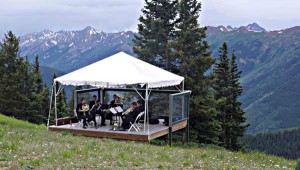The Aspen Music Festival, 8000 feet above sea level and high in the Colorado Rocky Mountains, is in full swing.  For 8 weeks 600 students from all over the world are making music literally around the clock: in concert halls, music tents, churches, a brass quintet has set up on a street corner just in front of the ice cream parlor usually in the afternoon between scheduled performances and the very handsome, very young Eylon Ben-Yaakov is regaling us with Chopin’s polonaise in A-flat, followed by Prokofiev’s piano sonata No, 3 at the Aspen Chapel, a faux 12th century construct.
For 8 weeks 600 students from all over the world are making music literally around the clock: in concert halls, music tents, churches, a brass quintet has set up on a street corner just in front of the ice cream parlor usually in the afternoon between scheduled performances and the very handsome, very young Eylon Ben-Yaakov is regaling us with Chopin’s polonaise in A-flat, followed by Prokofiev’s piano sonata No, 3 at the Aspen Chapel, a faux 12th century construct.
The great majority of the students are Asians and one is reminded of the joke told in the 1980s when one hundred thousand Russian Jews were allowed to leave the then Soviet Union and arrived in Israel, depopulating entire orchestras from Alma Ata to Petrosibirsk ”What do you call a Russian émigré arriving in Tel Aviv without a violin? Answer: “A pianist.” Same applies to the Chinese here.
While it was hard then and maybe still is to discern the definitive sound of the Israeli Philharmonic among all those Russian performers, who can tell from the program if first violinist Aaron Bronstein is a recent arrival or a born and bred Israeli? The Chinese musicians are of course easy to spot, usually occupying first rows among the string instruments. They demonstrate fierce concentration and rigid posture, any emotion is kept in check and it is only when the audience breaks out in frantic applause, jumping to their feet, that they allow themselves a bright smile.
 Israeli musicians have not exactly been absent from the program. The parents of Gil and Orli Shahan, physicists both, have been bringing their children to Aspen since they were three and five years old, when they were lecturing at the Aspen Center for Physics, a hub for hundreds of scientists, 65 Nobel laureates among them, and where a minyan could be convocated before anyone could say: “oy, gewalt”!
Israeli musicians have not exactly been absent from the program. The parents of Gil and Orli Shahan, physicists both, have been bringing their children to Aspen since they were three and five years old, when they were lecturing at the Aspen Center for Physics, a hub for hundreds of scientists, 65 Nobel laureates among them, and where a minyan could be convocated before anyone could say: “oy, gewalt”!
This year, to celebrate the 50th anniversary of the Aspen Center for Physics, Orli and Gil Shahan performed Brahms and Mendelssohn before a sell out crowd, and another young and attractive Israeli pianist, renowned Inon Barnatan vowed the audience in the Benedict music tent with the powerful rendition of Ravel’s La Valse.
A few years ago the conductor James Conlon created a mini-festival here called “Forbidden Music: Silenced Voices” championing a group of European composers whose lives and works were suppressed by the National Socialists in the 1930s and 1940s, among them major works by Zemlinsky and Erwin Schulhoff, Viktor Ullmann and Carl Frühling, names almost all forgotten now. Had their lives not been snuffed out by the Third Reich, who knows what 20th century music may have looked like?
From our correspondent Emily Vogl